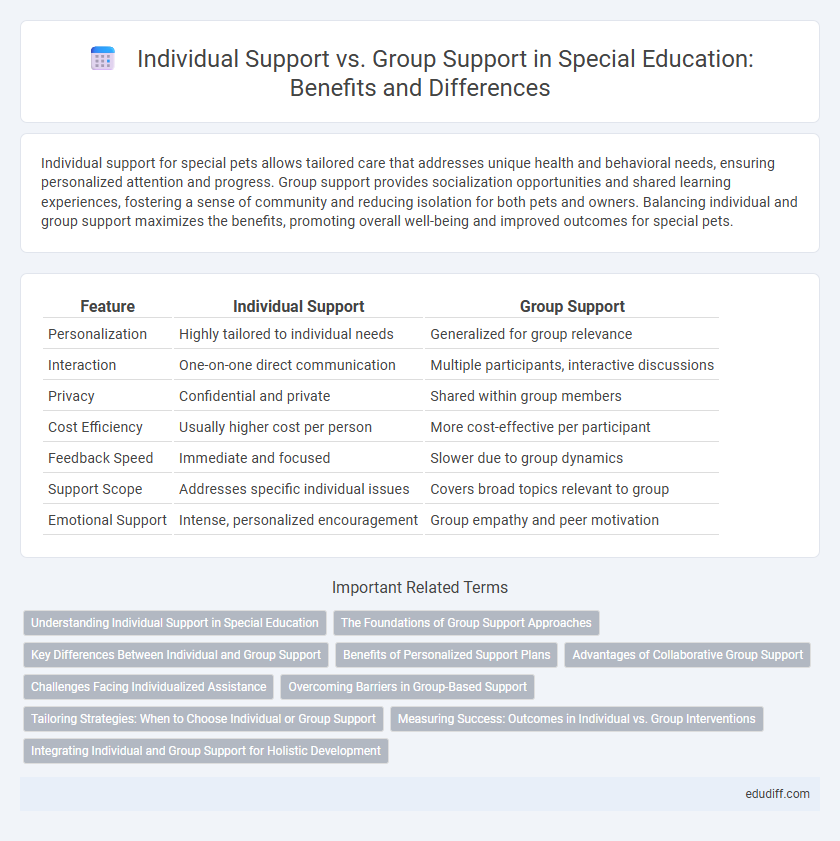Individual support for special pets allows tailored care that addresses unique health and behavioral needs, ensuring personalized attention and progress. Group support provides socialization opportunities and shared learning experiences, fostering a sense of community and reducing isolation for both pets and owners. Balancing individual and group support maximizes the benefits, promoting overall well-being and improved outcomes for special pets.
Table of Comparison
| Feature | Individual Support | Group Support |
|---|---|---|
| Personalization | Highly tailored to individual needs | Generalized for group relevance |
| Interaction | One-on-one direct communication | Multiple participants, interactive discussions |
| Privacy | Confidential and private | Shared within group members |
| Cost Efficiency | Usually higher cost per person | More cost-effective per participant |
| Feedback Speed | Immediate and focused | Slower due to group dynamics |
| Support Scope | Addresses specific individual issues | Covers broad topics relevant to group |
| Emotional Support | Intense, personalized encouragement | Group empathy and peer motivation |
Understanding Individual Support in Special Education
Understanding individual support in special education emphasizes tailored learning strategies that address each student's unique cognitive, emotional, and social needs. Personalized interventions improve academic outcomes and foster self-regulation by adapting teaching methods, assistive technologies, and behavioral supports. This approach contrasts with group support, which offers peer interaction but may lack the specificity required for addressing individual challenges effectively.
The Foundations of Group Support Approaches
Group support approaches are grounded in the principles of collective engagement, shared experiences, and peer interaction, which foster a sense of community and mutual accountability. These foundations emphasize the dynamic interplay of social support networks, enhancing motivation and resilience through collaborative problem-solving and emotional reinforcement. Unlike individual support, group approaches leverage diverse perspectives and social learning to create a robust environment for sustained personal growth and behavioral change.
Key Differences Between Individual and Group Support
Individual support provides personalized attention tailored to a person's unique needs, allowing for specific goal-setting and one-on-one interaction. Group support fosters peer connection and shared experiences, promoting social learning and collective motivation among members. The key differences lie in the level of personalization, interaction dynamics, and the scope of emotional and social benefits offered.
Benefits of Personalized Support Plans
Personalized support plans provide tailored interventions that address an individual's unique needs, enhancing effectiveness and fostering greater progress. These plans capitalize on specific strengths and challenges, resulting in improved engagement and motivation. Customized strategies also facilitate continuous monitoring and adaptation, ensuring sustained success in personal development.
Advantages of Collaborative Group Support
Collaborative group support fosters shared learning experiences, enabling individuals to benefit from diverse perspectives and collective problem-solving. This approach enhances motivation and accountability by creating a supportive community atmosphere that encourages active participation. Group dynamics often lead to increased resource sharing and emotional encouragement, which can accelerate personal growth and achievement of common goals.
Challenges Facing Individualized Assistance
Individualized assistance often faces challenges such as limited resources, difficulty in tailoring support to diverse needs, and maintaining consistent engagement. Unlike group support, one-on-one attention requires more specialized skills and time investment from caregivers or educators. Furthermore, measuring progress and adapting strategies in individualized settings can be complex due to the personalized nature of the interventions.
Overcoming Barriers in Group-Based Support
Group-based support offers diverse perspectives and shared experiences, essential for overcoming social stigmas and reducing feelings of isolation in individuals facing challenges. Facilitating open communication and fostering empathy within groups enhances motivation, while targeted individual support addresses specific personal barriers that group settings may overlook. Combining tailored individual interventions with collective encouragement optimizes resilience and long-term success in overcoming obstacles.
Tailoring Strategies: When to Choose Individual or Group Support
Tailoring strategies for support hinges on the nature and goals of the intervention, where individual support excels in addressing personalized needs and unique challenges through focused attention and customized feedback. Group support leverages collective experiences and peer interaction to foster motivation, diverse perspectives, and social skills development, making it ideal for collaborative learning and shared goals. Selecting between individual and group support requires evaluating the specific context, desired outcomes, and the benefits of personalized versus communal engagement to optimize effectiveness.
Measuring Success: Outcomes in Individual vs. Group Interventions
Measuring success in individual interventions often relies on personalized outcome metrics tailored to a participant's specific goals and progress, ensuring targeted improvements in behavior or skills. Group support outcomes are frequently assessed through collective indicators such as overall group cohesion, shared goal achievement, and peer feedback, highlighting social dynamics and collaborative effectiveness. Comparing results, individual support tends to yield more precise, customized improvements, while group support fosters broader social benefits and collective behavioral changes.
Integrating Individual and Group Support for Holistic Development
Integrating individual and group support enhances holistic development by addressing personalized needs while fostering social skills and collaboration. Individual support tailors interventions based on specific strengths and challenges, ensuring targeted growth. Group support complements this by promoting peer interaction, empathy, and collective problem-solving, creating a balanced developmental environment.
individual support vs group support Infographic

 edudiff.com
edudiff.com